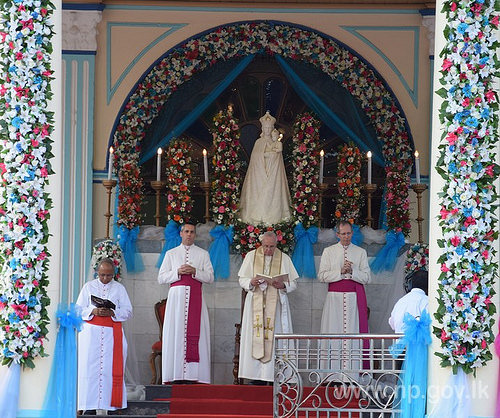
The news of Pope Francis’ passing earlier today has been met with mourning and reflection across the world. For Eelam Tamils, his legacy is remembered not only for his humility and progressive voice within the Catholic Church, but also for the moral clarity he brought to the unresolved injustice of the island’s bloody past, articulated during his historic visit to the Tamil homeland.
In January 2015, Pope Francis made history by becoming the first pope to visit Tamil Eelam. Just six years after the Sri Lankan military ended its genocidal war with a scorched-earth campaign that killed tens of thousands of Tamil civilians, he stood in the holy grounds of Madhu and called for justice.
In travelling to the Church of Our Lady of Madhu in Mannar, the symbolism was profound. That church, a sanctuary defiled by artillery shells and transformed into a refugee camp during the war, had become a testament to Tamil resilience. More than half a million gathered to see him.
He denounced the “evil” conflict that “tore open the heart” of the island and stressed that truth was essential to reconciliation – “not for the sake of opening old wounds, but rather as a necessary means of promoting justice, healing and unity.”
On an island still reeling from the genocide and where the political establishment refused to reckon with it, these words mattered. In the years since, Sri Lanka has repeatedly failed to account for the war crimes committed during the final stages of its armed conflict. Despite promises and pronouncements, there has been no credible accountability. No independent investigation. No war criminal held to account. Instead, successive Sri Lankan governments have pursued policies of militarisation, land grabs, and Sinhala Buddhist colonisation of the North-East. The architecture of impunity has only grown stronger.
Pope Francis, to his credit, did not lend credence to that impunity. His statements stood in contrast to other world leaders who parroted the Sri Lankan state’s calls for “reconciliation” while sidestepping the reality of mass graves, forced disappearances and systemic denial of justice. Yet, for all his words, justice in remains elusive. The international community seems content with empty mechanisms and state-led “reconciliation” charades. On the island, the cycle of oppression and denial continues.
The Pope’s passing comes just hours after his final Easter message, where he again called for a ceasefire in Gaza and condemned the “deplorable humanitarian situation” brought on by Israel’s war on Palestinian civilians. Just a day before his death, Pope Francis again turned the world’s gaze toward the most brutal frontlines of suffering. Even in his final moments, he stood where few global leaders dare.
Pope Francis was above all, a humanitarian. His words in Mannar, and more recently on Gaza, were a staunch reminder that the voices of victims must be heard and not buried beneath layers of geopolitics and diplomatic silence.
For the Tamil people, his visit was a rare moment of international recognition. As we reflect on his death, we remember a pope who dared to speak of justice in a land stained by genocide. A pope who stood with the wounded and insisted that peace must begin with truth.
The unfinished work of justice remains.
